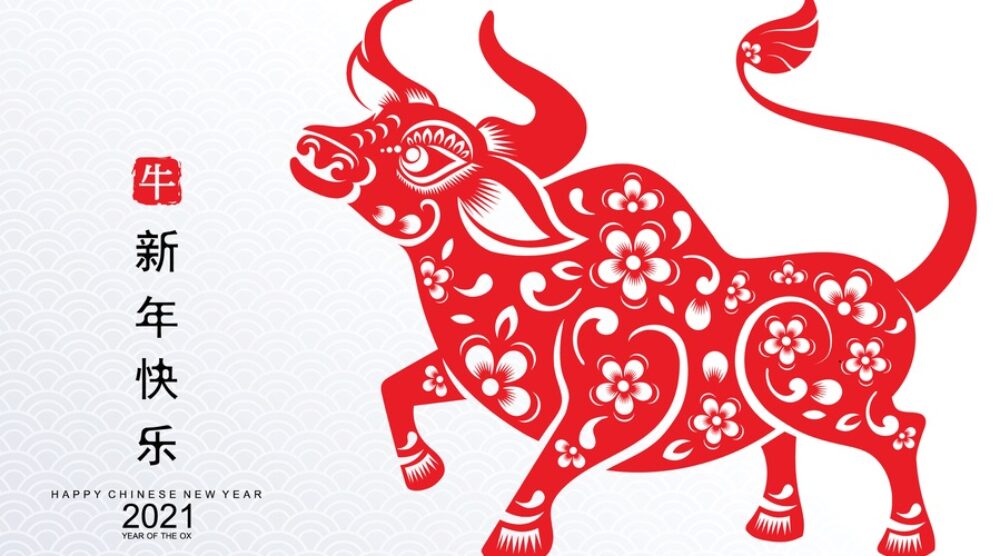Most of us were probably happy to farewell the Year of the Rat (2020). I know I was. By any standard it was an awful year.
Indeed, historians of China pick out the so-called gengzi 庚子rat years, 1840, 1900 and 1960, as among the worst in China’s modern history. In 1840, the first Sino-British or First Opium War was heaping humiliation on China. In 1900, seven Western countries and Japan invaded China to defeat the Boxer Rebellion. These eight were united, for the first and only time in history (usually they were at each other’s throats), against supine China, while the following year’s Boxer Indemnity demanded that China pay for the honour of being invaded!!! And 1960 was a year of dreadful famine, following the disastrous Great Leap Forward.
This year the Spring Festival or lunar (Chinese) New Year fell on 12 February, introducing the niu牛year. Niu means cow (female), bull (male), steer (castrated male) or ox (castrated male, but also more generic). Ox is by far the most usual translation and that’s the one I’ll adopt here.
What kind of an animal is the ox, in China or anywhere else? Hard-working, obedient, strong, loyal, reliable, resilient. It’s not like the rat. When the legendary Jade Emperor invited the twelve animals to a party, the rat got there first by tricking the ox. To cross a river, the rat asked the ox for a lift because it could not swim. But when the ox agreed and took the rat to the other side, instead of helping and thanking the ox, as a reasonable being would, it simply darted off to win the race, without even thanking the ox. Because the rat won the race, the rat year is the first in the zodiac, but the ox is next.
Among the Chinese zodiac animals, several have been domesticated, such as the pig, the sheep/goat and the horse. And then of course there’s the ox, a beast of burden, good for pulling loads, and also for its meat as well as producing milk and all kinds of dairy products. The ox is a paragon of productivity.
So we’d expect the ox year to be better for people’s livelihood. They say that this year 2021 will be good for economic recovery and for long-term investments. Government representatives are telling us this will happen. Let’s hope so. There shouldn’t be any major catastrophic events (anyway let’s hope not). The preceding year of the rat saw the emergence of a new plague, like the black death and such epidemics. But the ox should be much more stable, productive and free of disaster. There are not that many animals more useful or universal than the ox. The rat that used its smartness and alertness to win the Jade Emperor’s race didn’t do us much good last year. Maybe the ox will be a bit more helpful.
Quite a few famous people were born in the year of the ox. Among political leaders these include Napoleon (1769-c.1820), Adolf Hitler (1889-1945) , Margaret Thatcher (1925-2013), and Barack Obama (born 1961), and among artists Vincent Van Gogh (1853-1890) is a standout. Then there’s the great comedian Charlie Chaplin (1889-1977) and much loved Princess Diana (1961-1997). I don’t think these require comment. I’ll only say that among the political leaders the record is mixed, but predominantly not wonderful. People still argue about Napoleon’s legacy, but his impact on Europe was undoubted. As for Hitler, just about everybody agrees it was disastrous beyond measure.
And what about Chinese people born in a year of the ox? Two stand out and they are definitely a bit more positive. On is Li Bai (701-62), who is China’s greatest poet from the most famous poetry dynasty, namely the Tang (618-907). Every child in China learns poems by him from the Three Hundred Poems of the Tang (Tangshi sanbai shou). And, if I may get Eurocentric for a bit, Gustav Mahler set some of his poems to music in his wonderful song-cycle The Song of the Earth.
Another Chinese born in an ox year is Liu Bei (161-223), a scion of the Han dynasty who became a warlord of the famous Three Kingdoms period. His career was romanticized in the famous novel The Romance of the Three Kingdoms (Sanguo yanyi) and became the focus of numerous Peking and other Chinese operas. All these have given him a pretty good historical image.
This Spring Festival holiday will be different from others. It’s still a “golden week” (jinzhou 金周) holiday. Traditionally, the Spring Festival is when people in China travel to see their families or relations. The trains, roads and planes are very heavily booked, and it is sometimes impossible to get a place.
But this year, there will be far fewer people travelling, due to COVID-19. And it’s not only travel. Activities with crowds of people will be much more restricted.
And of course, the Spring Festival is not just in China, it’s very popular in Southeast Asia and in other places with significant Chinese communities. For example, in Melbourne and Sydney there have been far fewer vibrant activities than usual this Spring Festival.
The ox is so productive and should make a lot of money for its owners. But maybe this year there’ll be less money made than usual, less carousing and banqueting. But helped by so loyal and hard-working an animal as the ox, and helped by several vaccines, this year has every chance of being better and healthier than last year when the nasty little rat oversaw so much damage.
Colin Mackerras AO FAHA is Professor Emeritus at the Griffith Asia Institute








